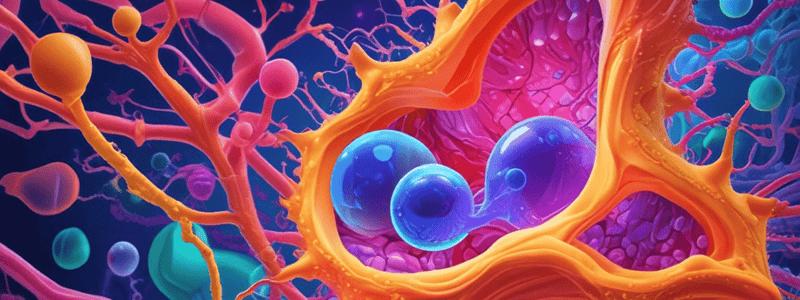Podcast
Questions and Answers
What type of transport allows the free passage of specific polar molecules?
What type of transport allows the free passage of specific polar molecules?
- Secondary active transport
- Primary active transport
- Facilitated diffusion (correct)
- Symport
Which type of transport involves carrier proteins that bind specific molecules and undergo a conformational change?
Which type of transport involves carrier proteins that bind specific molecules and undergo a conformational change?
- Primary active transport
- Secondary active transport
- Simple diffusion
- Facilitated diffusion (correct)
In which type of transport do molecules move through transmembrane protein channels forming a pore that only allows the passage of water molecules?
In which type of transport do molecules move through transmembrane protein channels forming a pore that only allows the passage of water molecules?
- Symport
- Simple diffusion (correct)
- Primary active transport
- Secondary active transport
What is the characteristic feature of aquaporins in terms of transporting water molecules compared to simple diffusion?
What is the characteristic feature of aquaporins in terms of transporting water molecules compared to simple diffusion?
Which type of transport involves the movement of positive charges towards the outside of the membrane to induce channel opening?
Which type of transport involves the movement of positive charges towards the outside of the membrane to induce channel opening?
What do carrier proteins in facilitated diffusion bind to on one side of the membrane?
What do carrier proteins in facilitated diffusion bind to on one side of the membrane?
Which process involves the transport of large molecules across the cell to the opposite domain of the plasma membrane?
Which process involves the transport of large molecules across the cell to the opposite domain of the plasma membrane?
Which type of vesicles are involved in transcytosis and do not fuse with lysosomes?
Which type of vesicles are involved in transcytosis and do not fuse with lysosomes?
Which integral membrane protein coats caveolae involved in transcytosis?
Which integral membrane protein coats caveolae involved in transcytosis?
What causes a curvature in the lipid bilayer during caveola formation in transcytosis?
What causes a curvature in the lipid bilayer during caveola formation in transcytosis?
Which process involves the uptake of selected molecules into small invaginations of the plasma membrane?
Which process involves the uptake of selected molecules into small invaginations of the plasma membrane?
During transcytosis, which of the following processes involves endocytosis followed by exocytosis without modification of vesicle contents?
During transcytosis, which of the following processes involves endocytosis followed by exocytosis without modification of vesicle contents?
Which statement accurately describes the mechanism of glucose uptake in epithelial intestinal cells?
Which statement accurately describes the mechanism of glucose uptake in epithelial intestinal cells?
Which of the following statements accurately describes the role of the sodium/potassium pump in the glucose uptake process?
Which of the following statements accurately describes the role of the sodium/potassium pump in the glucose uptake process?
Which of the following transport mechanisms is represented by the process labeled 'F' in the figure?
Which of the following transport mechanisms is represented by the process labeled 'F' in the figure?
What is the main driving force behind the secondary active transport of glucose in epithelial intestinal cells?
What is the main driving force behind the secondary active transport of glucose in epithelial intestinal cells?
Which of the following statements accurately describes the symport mechanism for glucose uptake?
Which of the following statements accurately describes the symport mechanism for glucose uptake?
Which of the following transport mechanisms directly utilizes ATP as an energy source?
Which of the following transport mechanisms directly utilizes ATP as an energy source?
Flashcards are hidden until you start studying



